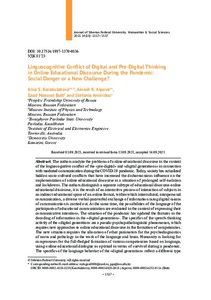Linguocognitive Conflict of Digital and Pre-Digital Thinking in Online Educational Discourse During the Pandemic: Social Danger or a New Challenge?
Скачать файл:
URI (для ссылок/цитирований):
https://elib.sfu-kras.ru/handle/2311/144718Автор:
Karabulatova, Irina S.
Aipova, Ainash K.
Butt, Saad Masood
Amiridou, Stefania
Карабулатова, И. С.
Аипова, А. K.
Бутт, С. М.
Амириду, С.
Дата:
2021-10Журнал:
Журнал Сибирского федерального университета. Гуманитарные науки. Journal of Siberian Federal University. Humanities & Social Sciences; 2021 14 (10)Аннотация:
The authors analyze the problems of online educational discourse in the context of the linguocognitive conflict of the «pre-digital» and «digital generations» in connection with mediated communication during the COVID‑19 pandemic. Today, society has actualized hidden socio-cultural conflicts that have increased the disharmonious influence on the implementation of online educational discourse in a situation of prolonged self-isolation and lockdowns. The authors distinguish a separate subtype of educational discourse-online educational discourse, it is the result of an interactive process of interaction of subjects in an indirect educational space of an online format, within which intercultural, interpersonal communication, a diverse verbal-paraverbal exchange of information using digital means of communication is carried out. At the same time, the possibilities of the language of the participants of educational communication are evaluated in the context of expressing their communicative intentions. The situation of the pandemic has updated the features in the decoding of information in the «digital generation». The specifics of the speech-thinking activity of the «digital generation» are a pseudo-psychopatholinguistic phenomenon, which requires new approaches to online educational discourse in the formation of competencies. The new situation requires the allocation of other parameters for the psychodiagnostics of norm and pathology in the work of the language and brain. Humanity is looking for compromises for the full-fledged formation of various competencies based on language, using online educational dialogue as optimal in terms of survival during a pandemic. The specifics of the language behavior of the «digital generation» reflect a different type of thinking than that of the representatives of the «pre-digital
generation». The article
reflects the results of an international study on the formation of students ‘ communicative
competence using online educational discourse during the COVID‑19 pandemic Авторы анализируют проблемы онлайн-учебного
дискурса в условиях
лингвокогнитивного конфликта «доцифрового» и «цифрового поколений» в связи
с опосредованной коммуникацией в период пандемии COVID‑19. Сегодня
общество актуализировало скрытые социокультурные конфликты, которые усилили
дисгармоничное влияние на реализацию онлайн-учебного
дискурса в ситуации
длительной самоизоляции и локдаунов. Авторы выделяют отдельный подтип учебного
дискурса – онлайн-учебный
дискурс, он есть результат интерактивного процесса
взаимодействия субъектов в опосредованном учебном пространстве онлайн-формата,
в рамках которого осуществляется межкультурная, межличностная коммуникация, разнообразный вербально-паравербальный
обмен информацией с использованием
цифровых средств коммуникации. Одномоментно оцениваются возможности языка
участников учебной коммуникации в контексте выражения их коммуникативных
намерений. Ситуация пандемии актуализировала особенности в декодировании
информации у «цифрового поколения». Специфика речемыслительной деятельности
«цифрового поколения» есть псевдопсихопатолингвистический феномен, что требует
новых подходов к онлайн-учебному
дискурсу при формировании компетенций.
Новая ситуация требует выделения других параметров для психодиагностики
нормы и патологии в работе языка и мозга. Человечество ищет компромиссы для
полноценного формирования разнообразных компетенций на основе языка, используя
онлайн-учебный
диалог как оптимальный в условиях выживания в период пандемии.
Специфика языкового поведения «цифрового поколения» отражает иной тип мышления,
чем у представителей «доцифрового поколения». В статье отражены результаты
международного исследования по формированию коммуникативной компетенции
у студентов с помощью онлайн-учебного
дискурса в период пандемии COVID‑19
Коллекции:
Метаданные:
Показать полную информациюСвязанные материалы
Показаны похожие ресурсы по названию, автору или тематике.
-
Проекты цифровой философии в контексте развития Digital Humanities
Груздев, А. А.; Самарин, А. С.; Илларионов, Г. А.; Gruzdev, Andrei A.; Samarin, Andrei S.; Illarionov, Grigorii A. (Сибирский федеральный университет. Siberian Federal University, 2023-07)Цель исследования – посредством сравнительного анализа определить основные формы существования цифровой философии как части Digital Humanities. Гипотезой выступает ризоматическая структура цифровой философии, не ... -
Enhancing Digital Skills: The Key to Digital Inclusion for the Older People (on Example of Vietnam)
Tran Thi Bich Ngoc; Dao Thanh Binh; Nguyen Thi Xuan Hoa; Barysheva, Galina A.; Tran Si Lam; Zhironkin, Sergey A.; Чан Нгок Тхи Бик; Дао Бинь Тхань; Нгуэн Тхи Суан Хоа; Барышева, Г. А.; Тран Си Лам; Жиронкин, С. А. (Сибирский федеральный университет. Siberian Federal University, 2023-10)Digital transformation taking place rapidly in all aspects of socioeconomic activities across Vietnam in recent years is affecting the lives of people of all ages. Vietnamese older people, due to the impact of digitization, ... -
Digital Humanities in the Conservation of Cultural Heritage
Lapteva, Marina A.; Gordeeva, Eugenia A.; Laptev, Alexei A.; Лаптева, М.А.; Гордеева, Е.А.; Лаптев, А.А (Сибирский федеральный университет. Siberian Federal University, 2016-07)The use of digital technologies in science has contributed greatly to the creation of new scientific directions and research aspects. The paper discusses tools, aims, methods and administrative instruments used in Digital ... -
The Digital Transactions Currency for the BRICS
Zharikov, Mikhail V.; Жариков, М.В. (Сибирский федеральный университет. Siberian Federal University, 2020-11)The article deals with the circulation of a digital currency as a worldwide problem. The topic has theoretical and practical significance because price stability, economic growth and development and market equilibrium ... -
Classification and Trends in Developing Digital Services In Russian Federation
Yury, Danilchenko; Natalya, Fedorova; Liudmila, Iushkova; Evgenia, Korepanova; Marina, Savelyeva (2019)The article defines a number of indicators for assessing the development of the digital market, and groups the digital services offered to consumers in the Russian Federation. The main trends and directions of development ...

